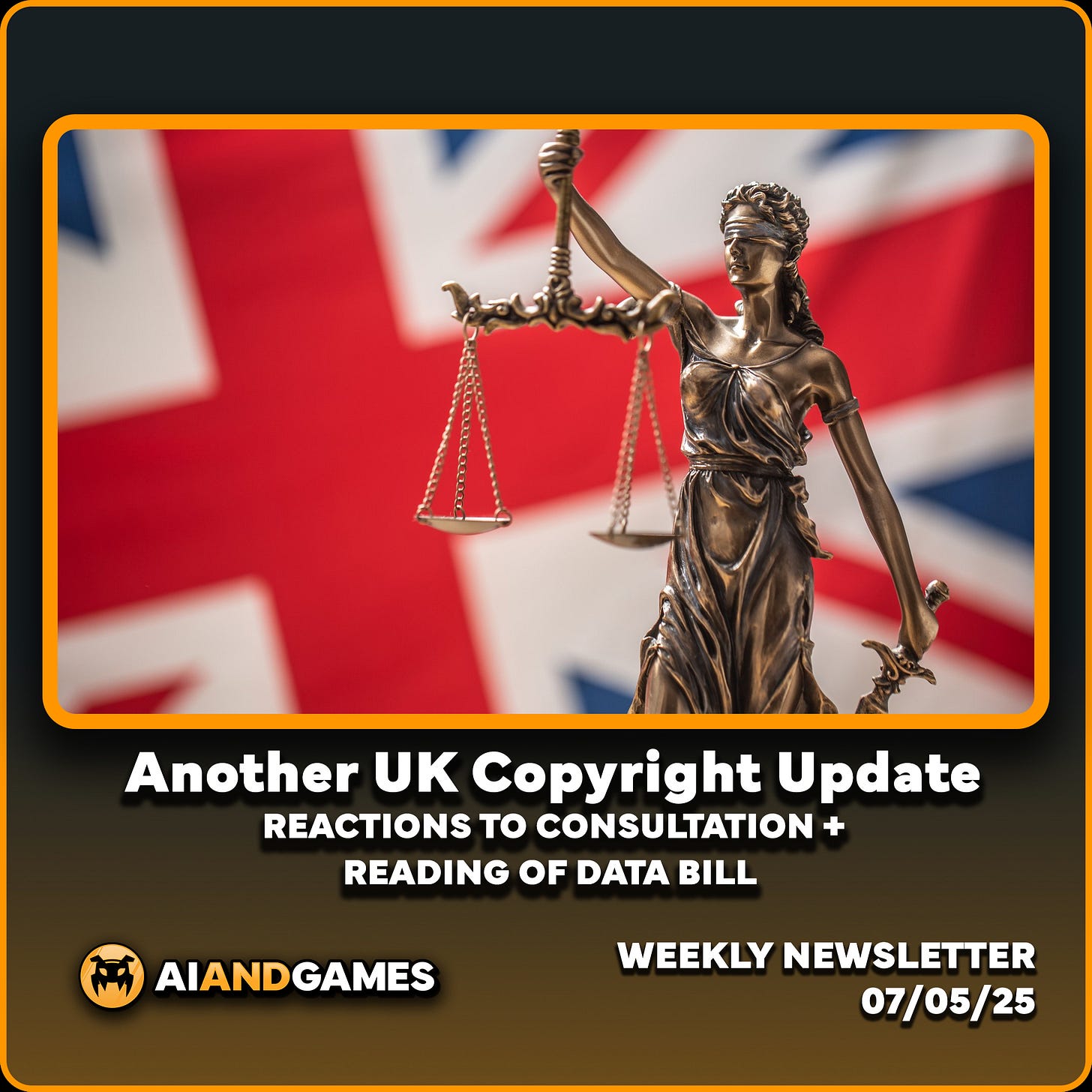Another UK Copyright Update | AI and Games Newsletter 07/05/25
Plus Sony's new AI-powered Game Remaster Patent!?!?
The AI and Games Newsletter brings concise and informative discussion on artificial intelligence for video games each and every week. Plus summarising all of our content released across various channels, like our YouTube videos and in-person events like the AI and Games Conference.
You can subscribe to and support AI and Games on Substack, with weekly editions appearing in your inbox. The newsletter is also shared with our audience on LinkedIn. If you’d like to sponsor this newsletter, and get your name in front of our audience of over 6000 readers, please visit our sponsorship enquiries page.
Hello and welcome to this weeks AI and Games newsletter. Man, these bank holidays in the UK are really throwing me out of sync of late. So this is a slightly shorter newsletter, but still we have plenty to talk about!
This week we’re returning once again to the UK copyright issue, and what’s going down in relation to this topic this week! Let’s get started.
Follow AI and Games on: BlueSky | YouTube | LinkedIn | TikTok
Announcements
Only one announcement for all things AI and Games related today, critically that the newsletter will be taking a break on May 21st as I’m heading off for a week’s vacation. We’ll be back up and running again on the 28th!
In the meantime, let us know if there are topics you’d like to hear more about as we roll into the summer!
AI (and Games) in the News
Not a lot of headlines this week, but worth checking in on them nonetheless!
Generative AI Not Mandated for Xbox Games Studios
In an interview with Game Developer at Gamescom LATAM, the founder and studio head of South of Midnight creators Compulsion Games, who are part of the broader portfolio of Xbox games Studios, made clear that the adoption of generative AI technologies is not mandated by Xbox. To quote the article:
"I can absolutely guarantee [that generative AI usage] is not mandated," says Provost. "You're talking to the studio that literally builds shit by hand. In the DNA of the studio that we have, we're very craft oriented. We're very art oriented."
This isn’t terribly surprising, given we’re still very much in the exploratory stages of this technology trend (believe it or not), and while I suspect Microsoft will support any exploration by a given studio, it would strike me as short sighted of them to enforce it. But still, nice to hear common sense is prevailing.
Sony Submits a Patent for Remastering Games via AI Rendering?
Okay, this is a weird one. Sony Interactive Entertainment submitted a patent application to the US Patent Office on April 24th entitled “Data Processing Method and System”. The patent itself is weird, or is weird as any patent application often is, but its discussing the process of applying images that overlay over existing images in the rendering of a virtual environment. The idea being that it uses the original images from the render and grabs relevant environmental data such as position, resolution, texture and lighting, and then sends that to a “remote computing device” to generate a new overlay image. The idea being to retrieve images that match the input. This could be pre-generated content, or content created on the fly. To a point that in the patent it is suggested using AI-based rendering, such as a machine learning model could be used to generate the images on the fly.
The patent itself then goes into detail on how such a workflow could be used to generate a remaster of a game. The idea being to effectively render a game as normal on a given device, and then in real time ‘remaster it’ by generating upscaled assets from another source, and then rendering them on the device. So the remaster wouldn’t be ‘made’ per se as a separate artefact, but rather that the game remasters itself (visually at least), in real time.
Like I said, we’re ending the news on a weird one.
UK’s AI Consultation Making an Impact?
Our big story this week is the one that keeps coming back and rearing its ugly head: the UK government’s ongoing exploration and potential legislation of AI in the context of copyright law. The situation continues to evolve, and is going to hit a critical point later this week, but for now let’s do a very quick summary and then get on with the meat of the topic.
Once again, a friendly reminder that I am but a friendly Scottish game/AI expert who by virtue of working in the games industry is now increasingly reading up on legal developments. I am not a legal professional, and my opinions should not be treated in any way as valid counsel or guidance.
What’s Going On?
In short, the UK government is going through a process of re-evaluating how copyright law works in an age of generative AI. It is already common practice for the works of individuals and businesses to be scraped by teams keen to use it as training data for AI models without compensation, or even recognition of source.
Back in January, I highlighted that the government had started moving forward with proposals on this as part of a broader ‘AI action plan’ aimed at making the Labour government look pro-active and invested in making AI ‘work’ for the UK. These proposals included allowing AI companies to use copyrighted works from the UK without permission lest the owner opts out. This has been poorly received - much to the surprise of nobody with any grasp of AI, creative industries, and late-stage capitalism. While I don’t detail in this issue what the implications are for the games industry, I do dig into this in the original January issue, so I encourage to you to dig into that if you don’t know why this is relevant to us in gaming.
Not only did this result in a variety of creatives speaking out individually about the perils this presents to a number of sectors, the Make it Fair campaign launched on the closing day of the consultation as the creative industries try to make the government see a modicum of sense on the issue - though notably no video game companies or organisations have aligned with it. We dug into why this is the case in an issue published last month, while also highlighting that the UK Intellectual Property Office (IPO) was overwhelmed by submissions to the consultation, and are now trying to make sense of it all.
As might be apparent, I am very much opposed to this, and stress in my original article that the UK should be moving forward as one of the first non-EU nations to more strictly dictate how AI training operates and intersects with creative sectors lest it run risk of destroying them. The rules on how AI operates in the space do not align with that of a human (be it as individual or organisations), and it should be adjusted to do so. Generative AI as a technology does not require this aggressive and destructive violation of intellectual property to work. It is a narrative perpetuated by the biggest players in this sector to prop up and support developments of their own products which would be even more economically unviable to maintain if they had to pay for the data they train on.
The Recent Updates
So to help make sense of this, I’m going to break down some recent developments, nicely summarised by work of Eleni Courea and Dan Milmo at The Guardian, and then try and give my insight and perspective on each part of this as I go. But the key things are:
UK Government is re-evaluating its approach in response to the consultation.
The consultation reaction arguably highlights how poorly thought out the governments stance on this was.
How recent developments surrounding legal action in the US may be influencing change.
How the next reading of the Data (Use and Access) Bill this week will aim to address some of this ongoing debate.
Re-evaluating the Approach
So first things first, per the work of Courea and Milmo on The Guardian, that ministers are considering moving away from the opt-out system of copyright rules as was originally described. It’s suggested that they are now looking at other proposals, with some possibly emerging as a result of the consultation.

To quote from the story, attributed to Peter Kyle, the secretary of state for the Department of Science, Innovation, and Technology (DSIT) (emphasis mine):
“We’re listening to the consultation and we are absolutely determined to get this right. We’re not going back to square one. We are moving forward.”
“We can’t pretend we can outlaw training in other countries who have their own copyright law, but we can build a system which works in the United Kingdom. Some elements of the consultation haven’t even featured in the debate so far.”
“We will be working hard to come up with practicable solutions to the very complex issue of how we enable both the creative industries and UK AI companies to flourish. We will report to parliament on issues of transparency and licensing and try to find some common ground on which we can agree.”
Now I want to pick up on the sentence I have highlighted in bold. In that “some elements”, meaning particular threads of discussion that arose in the consultation, “haven’t featured in the debate so far”. This is pretty damning in my view, in that we have a secretary of state responsible for legislation on technology who is being caught off guard by responses to a consultation of the British public on what is arguably one of the most critical topics of the era. The creative industries not liking the proposals was a given, and I’ve already discussed the far reaching implications it has on games as well as other sectors. But to suggest there are ideas emerging from the consultation that had not been considered is rather concerning.
Sadly it strikes me that this has been approached purely as a technological problem, rather than considering the implications for creative industries not to mention other sectors! The government has only recently promised to carry out an economic impact assessment of its proposed changes, which will conclude and be acted upon after any legislation is enshrined in law, and that may well take until the end of their current tenure as acting government. It’s a ‘shoot-first, ask questions later’ approach to a subject that has significant implications for the wider economy and much more besides. Why an economic study wasn’t initiated before any proposed action plan was announced speaks of a lack of foresight.
It is expected that some amendments will be proposed as part of the upcoming reading of the Data (Use and Access) Bill (DUAB) later this week to provide some protections against the opt-out approach, which we will discuss in a moment. But the DUAB much like everything else about this whole process speaks to a government moving too fast for it to make any meaningful change.
Legal Battles Overseas
In last weeks issue, we talked a lot about the Ziff Davis vs OpenAI lawsuit that just got submitted to court in Delaware, and if anything I think it highlights quite nicely the issues that are emerging that perhaps the UK government is finally taking notice of.
To summarise, Ziff Davis - one of the largest media companies in the world - is suing OpenAI for both their continued scraping and stealing of their intellectual property for training purposes, to a point you can get ChatGPT to reproduce their works verbatim. But also for failing to protect the integrity of sources they steal from, given the results ChatGPT produces fail to report on these stolen materials accurately. It’s quite an interesting development for sure. Go read it if you haven’t already.
Frankly I have no indication as to whether the UK Government is paying attention to this sort of thing. However, the key thing is the lawsuits are only ever increasing: the charges are becoming more specific, the receipts all the more damning, and many a major AI player - be it OpenAI, Anthropic, Meta or otherwise - are getting caught in the crosshairs.
I looked at that original UK AI Opportunities Action Plan from last year and it struck me as rather spineless. In an effort to make the UK look appealing to AI investors they’re willing to give up the countries intellectual property on a silver platter, and to stymy legal action being taken against them. It not only protected them from repercussions, but gave them what they wanted all with this attitude of how this is the next step towards an AI-generated sunlit uplands. But we continue to see these companies are engaging in dodgy business even when told not to. The Ziff Davis lawsuit highlights they made efforts to block OpenAI from scraping their content and they did it anyway. But also the fact that it brings the quality of their work in disrepute, at a time when people are (foolishly) using GPT more and more as a search engine, it highlights there are multiple axis by which companies be it Ziff Davis or otherwise are aiming to bring legal action against these businesses.
As a general point: do not use LLMs like GPT as a search tool. There is no guarantee it produces valid and accurately sourced responses for what you’re looking for. Even if you despise Google, save the money you’d give to OpenAI and use Kagi. At least they prioritise giving you accurate results rather than advertising or slop.
The issue of ‘GPT stealing my work’ is one that the UK’s action plan by its design was aimed to circumvent. The Ziff Davis suit is the latest in a number of instances where it’s proven that - despite their best efforts to prevent it - you can generate training data in the responses of a large language model with clever prompting. But if governments turn around and say that’s perfectly valid, then those legal cases will fall fault. But what we’re seeing now with Ziff Davis is the emergence of more than just intellectual property concerns, but of brand image and reputation, and of the damage potential of technologies that produce inaccurate information. Companies like Google have already incurred the wrath of the legal system for manipulating search results, in essence failing to accurately report information of what is available on the internet. It seems like other major AI companies may well be next if they’re scraping information and then reporting on it inaccurately.
The Data (Use and Access) Bill Reading
The final point to raise is that this week The Data (Use and Access) Bill (DUAB) is making its way back into the House of Commons on May 7th. For some context, this is a bill that has been moving fast through both the House of Commons and the House of Lords since the government came into power last summer, with the first reading back in October 2024. It is in essence something of a continuation of the Data Protection and Digital Information Bill (DPDI) that the Conservative government was bashing around as far back as early 2023 but it never passed the House of Lords prior to the government imploding by triggering a general election in the spring of 2024 - thereby torpedoing several bills in the process.
The DUAB aims to be a broad sweep of adjustments to how data is handled in the UK. It’s a beefy bit of stuff, and at over 250 pages it details various ways in which amendments to existing legislation would strengthen data protection in various ways. While similar in principal to the DPDI, it is very much its own beast, and has ruled out a number of ideas the Conservative government sought to adopt (the most controversial of which was removing the need for data processing officers in organisations as part of GDPR regulation). The new bill focusses on a bunch of stuff, including:
Refining the definition of ‘legitimate interest’ in retaining data without need for a distinct interests assessment.
New special categories of personal data to be introduced.
Changes to how Data Subject Access Requests (DSARs), i.e. the process of requesting information from an organisation about data they have on you, is processed and handled.
Streamlining GDPR processes for (legal) international data transfers.
How internet cookies can be enabled without the need for user consent (often in non-invasive use cases)
New guidelines on fines and penalties for non-compliance to GDPR and the lesser-known Privacy and Electronic Communications Regulation (PECR) from 2003.
Last, but by no means least, a process of relaxing the rules behind automated decision-making in the handling of personal data.
Spoiler alert: this is where all of this stuff becomes relevant!
Per my earlier comment of approaching this purely as a technology problem, it all comes down to this legislation. In that it has far reaching implications but it’s being led solely by the DSIT. It doesn’t strike me that a cross-parliamentary approach has been made here (by all means, if I’m wrong, please let me know in the comments), where they could have worked with the Department for Digital, Culture, Media & Sport (DCMS) which would help give the relevant insight from the creative industries. This has only been reinforced by the fact that Peter Kyle has had numerous meetings with tech companies in an effort to get his head around the issue, and yet no engagement with the creative sector whatsoever.
The reason this is all relevant, is that now the government has stated they will make an amendment to this bill to prevent the opt-out approach being considered for copyright law. But still doesn’t really prevent a lot of the larger issues with this whole process being addressed. That said, it is expected that changes are made for AI transparency, lest it be knocked back down from the House of Lords on its next reading.
Sadly, this bill is getting caught up in a number of issues for different reasons. After all as highlighted above the use of AI is but one small part of a much larger document. But critically numerous political footballs are being fired at this bill at high speed. With an opposition amendment being considered for the banning of social media to under 16’s - suggesting that neither the Liberal Democrats or the Conservatives actually watched Adolescence on Netflix but asked GPT to write a summary about it. Plus the Conservatives are using it to push their transphobic agenda following the recent ill-considered Supreme Court case by having a further amendment to ignore Gender Recognition Certificates (GRCs) in data processing for the likes of the NHS and the DVLA.
The bill is being read on the day of this newsletter’s publication. So we’ll wait and see what comes of it in the near future.
Wrapping Up
A shorter edition than usual, but we’ll be back to normal next week before I then disappear to a secret and sunny location to get some much earned rest. Thanks for reading and we’ll catch you all next week!












